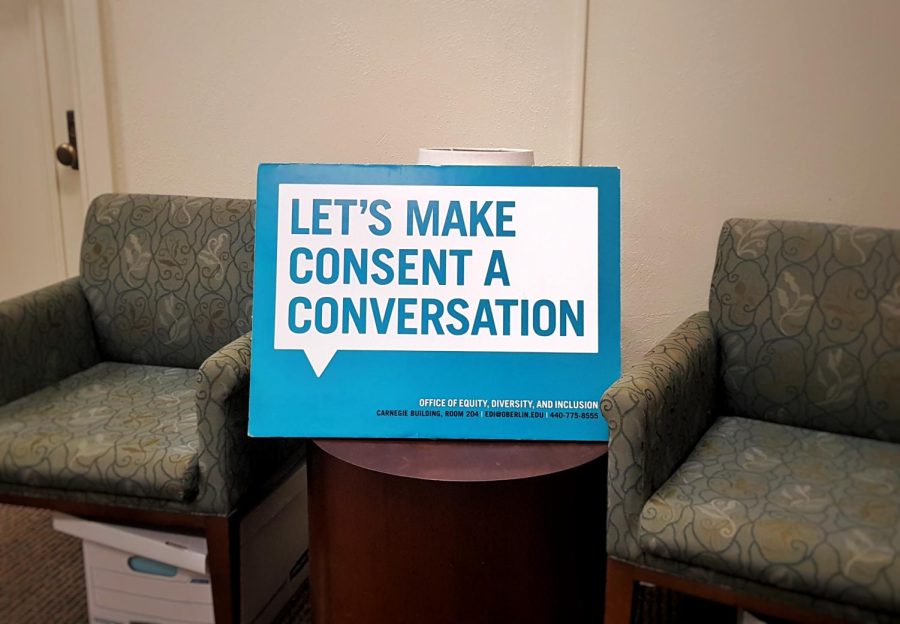Oberlin Completes 2022 Campus Climate Survey
In March and April, the Office of Equity, Diversity, and Inclusion administered a survey to students to gather data on sexual misconduct and violence.
Editor’s note: This article discusses anti-Black racism and sexual assault.
Last week, the College finished circulating its fourth Higher Education Data Sharing Sexual Assault Campus Climate Survey. The survey, which the College has administered every two years since 2016, gives the Office of Equity, Diversity, and Inclusion important information about safety on campus and helps shape its services.
College campuses around the U.S. administer the HEDS survey to determine information about attitudes towards sexual violence, ways colleges can make campus safer, and the level of knowledge students have about campus resources.
The last time the College offered the campus climate survey was the week it sent students home in March 2020 due to the start of the COVID-19 pandemic. As a result, the survey had a low response rate. This year’s survey will give the Office of Equity the first complete picture of sexual assault on campus since 2018 and will also give an indication of how things have changed on campus as a result of the pandemic.
“COVID-19, I think, has changed the way the interactions occur between students,” said Director for Equity, Diversity, and Inclusion and Title IX Coordinator Rebecca Mosely. “ I think it’s changed to some extent the experiences students may have had prior to arriving at Oberlin. So I’m really interested in comparing this year’s results, … how do those match with the things that we saw pre-COVID, and are there pieces in there that we now need to be thinking about differently because of all of our lived experiences having changed?”
In the past, the survey has given the College important metrics for understanding perceptions and experiences of sexual violence on campus. The College has used this information to implement changes to increase safety on campus, including guiding curriculum creation for the bystander intervention program and creating Preventing and Responding to Sexual Misconduct program.
“We made mandatory the bystander intervention training because one of the big factors that came out of that climate assessment was that there were bystanders present way more than we expected,” Mosely said. “The results from the 2018 survey showed that there was improvement on the intervention.”
Despite the critical nature of the knowledge collected by this survey, the College does not make the collected data available to the public. While students and faculty can request the data for research purposes, they are not allowed to disseminate it. Since many sexual assaults are not reported to Campus Safety, they are not included in the College’s official crime records. This means that the most accurate source of data on the number of sexual assaults on campus is kept confidential.
Because of this, some students feel the confidentiality silences survivors’ stories and goes against the idea of speaking out on sexual violence because the College itself won’t speak out on the statistics itself.
“I would say it’s a form of silencing survivors in itself, because it’s kind of like if the school won’t… tell my story … even as just a statistic, how am I supposed to tell my own?” said College fourth-year and Survivors of Sexual Harm and Allies administrative team member Lauren Fitts. “Them being open about that would encourage more students to feel open talking about these things, and maybe … we [could] finally work to [put] a stop to this violence that is happening a lot, quite frankly, on this campus.”
Despite the lack of public data, this year’s survey promises to give administrators important information about safety on campus during the COVID-19 pandemic. The survey is especially important because it gives students a truly anonymous way to speak about their experiences at Oberlin.
“I think the anonymity of it is a positive thing as well, because a lot of times survivors are concerned about reporting to the Title IX office,” said College third-year and SOSHA founder Emma Hart. “It can be really daunting and scary, which makes complete sense. And this offers a way that people can have their voices heard anonymously without having to make a formal report.”







